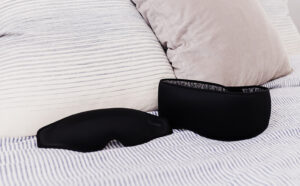FREE SHIPPING OVER $99
- Home
- Blog
- Sleep & Comfort
- How can stress affect sleep?

How can stress affect sleep?
Believe it or not, our bodies were designed with a built-in stress ‘mechanism’. It’s a survival system.
Back in the days when we would encounter a dangerous sabre tooth tiger while hunting and gathering, being equipped to respond was literally a life saver. When faced with a threat, a signal from our brains to our adrenal glands would release two main hormones – adrenaline and cortisol.1 Perhaps you’ve heard this described as the fight or flight response.
Adrenalines prepare the body by diverting blood to where it would be needed most – the muscles, brain, arms and legs and cuts flow to the skin. Heart rate is increased to pump oxygen and energy around and blood pressure increases.2
Cortisol increases glucose supply in the blood to fuel the response to danger, and supresses both the immune system and the digestive system.1
We don’t meet sabre tooth tigers these days, but we do occasionally face other threats like a ferocious dog or dangerous person. Once the threatening situation is over, our bodies usually return to normal, with adrenaline and cortisol levels dropping.
However, it would be fair to say most of our modern-day stresses relate to concerns at work or home, or financial worries. It’s this continual activation of the stress response that can have a serious impact on our health and wellbeing.1 The overexposure to cortisol increases our risk of:
- Mental health issues such as anxiety and depression1
- Cardiovascular issues such as heart attack, high blood pressure and stroke1
- Muscle tension and headache1
- Weight gain1
- Type 2 diabetes3
- Sleep problems1
Sleep problems are probably the most noticeable and early signs of stress. We’ve most likely all had times when we worry about something and have problems falling asleep or the quality of our sleep is compromised.
Unfortunately, sleep problems may also contribute to the risk factors above. (Read more about the relationship between sleep and mental health here.)
So, we find ourselves in this perpetual cycle – “I can’t sleep because I’m stressed and I’m stressed because I can’t sleep”.4 In fact, lack of quality sleep triggers our stress response system, leading to the release of more cortisol.5 You can see why a good night’s sleep is so important.
What can we do about it?
Learning to relax or meditate before bed would be a great start, and a simple internet search will give you an abundance of tips and techniques. But keep in mind that there are other things that could still be impacting your ability to get a good night’s sleep.
Firstly, there’s the sleep environment. It needs to be quiet, and it needs to be free of intrusive light.
Whether the light is artificial, or natural, or the glow of your phone, tablet or TV screen, it can have a major impact on your ability to sleep.6
Exposure to darkness tells our body to start producing a natural hormone called melatonin while exposure to light causes that production to stop. Melatonin helps regulate our circadian rhythm or body clock and synchronize our sleep-wake cycle. Melatonin is usually released a couple of hours before your normal bedtime6 (which is why going to bed at the same time each night is a good idea).
In contrast, exposure to light shuts down production of melatonin.7
If you can’t shut out light, consider a sleep mask. Just make sure it fits well to effectively block out the light, but also make sure that it’s comfortable – eight hours is a long time.
The range of masks from Dreamlight have harnessed technology to ensure comfort without compromise. You can check out the range here.
Sources:
- https://www.mayoclinic.org/healthy-lifestyle/stress-management/in-depth/stress/art-20046037
- https://www.verywellmind.com/what-is-the-fight-or-flight-response-2795194
- https://www.diabetes.org.uk/research/our-research-projects/midlands/stress-hormones-and-risk-of-type-2-diabetes
- https://www.sleepfoundation.org/insomnia/stress-and-insomnia
- https://www.bcm.edu/news/how-stress-can-affect-your-sleep
- https://www.hopkinsmedicine.org/health/wellness-and-prevention/melatonin-for-sleep-does-it-work
- https://www.healthline.com/nutrition/melatonin-and-sleep#how-it-works
Tags
Leave a Comment Cancel reply
SUBSCRIBE
Subscribe to our mailing list so that you can be the first to know about new products and promotions.
© 2024. All Rights Reserved.






